Belarusian civil society, which steps beyond the formulations of the current Belarusian regime’s law “On Civil Society” (2023), continues to face the active spread of false and fake information.
As part of strategic monitoring, incidents of disinformation regarding the theme of civil society were analyzed with the aim of collecting evidence for coordinating actions in the field of strategic communications. A total of 1442 mentions from 120 sources were collected for December 2023:
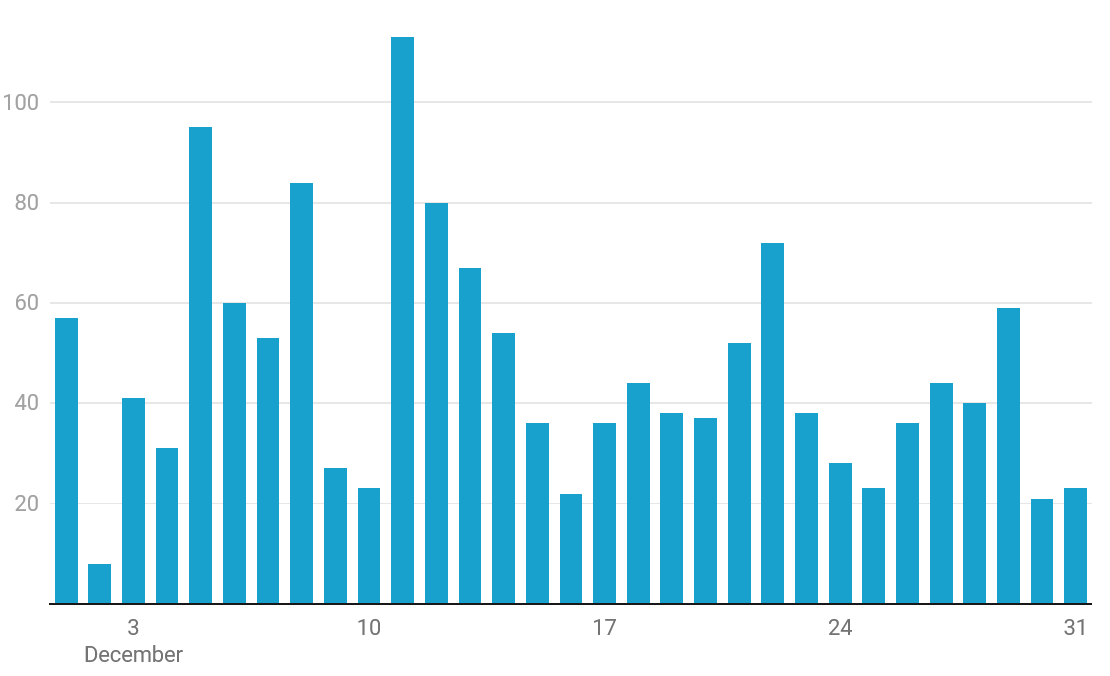
Among the sources, thirteen media with state ownership were selected, including belta.by, sb.by, ont.by, tvr.by, and the popular news source in Belarus – sputnik.by, belonging to the Russian MIA “Rossiya Segodnya.” In December, there were 91 publications on the researched topic.
First of all, it is worth noting the periodicity of publications: at the beginning of the week; in the first half of December, there were more than at the end of the month.
The main categories of publications:
- connection with the upcoming February 25, 2024, single voting day – elections* – 30 publications;
- basis for the upcoming elections (possibly with two asterisks) in the All-Belarusian People’s Assembly (ABPA) – 8 publications;
- discrediting and devaluing the principles of existence of civil society, accepted in democratic countries and declared in the documents of all international organizations, including the United Nations (UN) and all its agencies – 19 publications.
The word cloud looks like this:
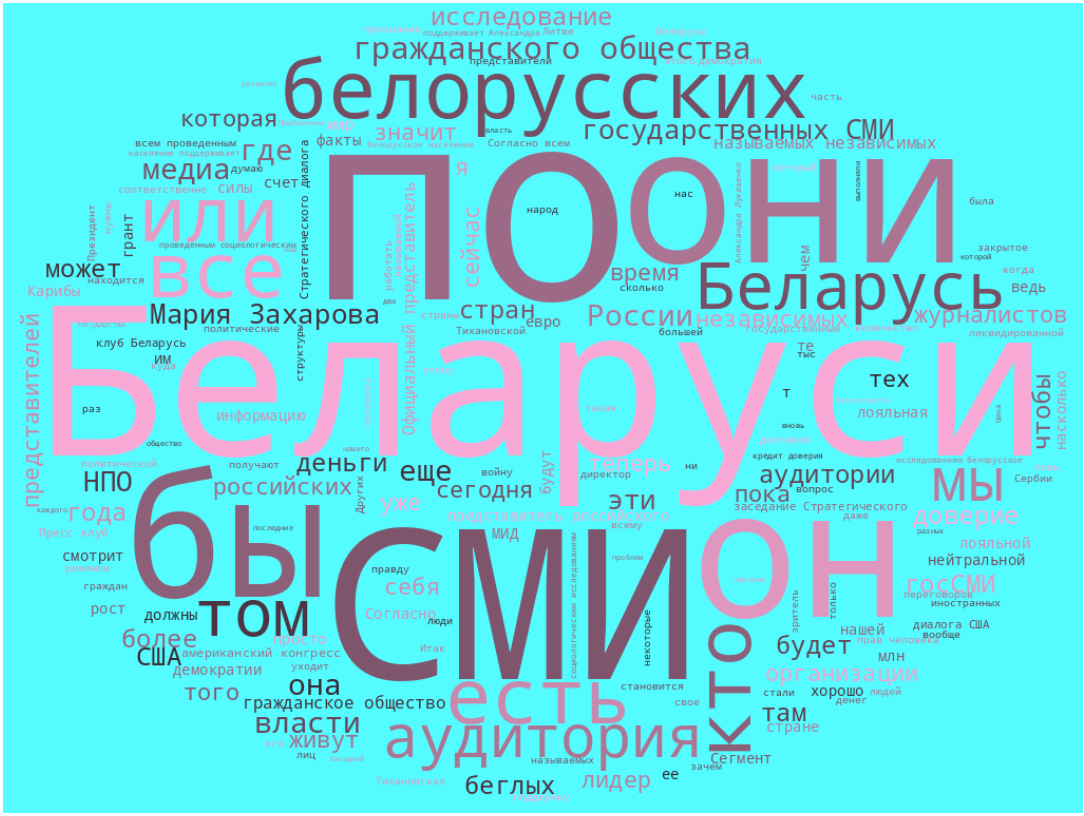
Notably, frequent use of the pronoun – THEY, as opposed to those who support the current state of affairs in the country.
Let’s analyze the most notorious publications, marked in red (RedAlert):
- Derogatory tone and language: the use of terms like “leader,” “Riga swindler” (sic!), and “cook” in reference to Svetlana Tikhanovskaya indicates a derogatory tone, which is often used in propaganda to discredit opposition figures.
- Reliance on conspiracy theories and stereotypes: accusations that Tikhanovskaya “spends money” and “fights the regime,” funded by the West, are typical examples of conspiracy theories used to discredit opposition figures and emphasize the idea of external interference.
- Comparison with other “unsuccessful” leaders: comparing Tikhanovskaya with Juan Guaido and Mikhail Saakashvili and stating that participating in the American Congress leads to sad consequences is a way to create a negative association and undermine her legitimacy.
- Demonization of Western countries: statements that “Washington has no other strategies for Belarusians,” and mentions of “Western media and experts” are aimed at creating a hostile image of the West, presented as manipulating and exploiting weak countries.
- Manipulation of facts and distortion of information: the text distorts reality, presenting Tikhanovskaya’s visit as something illegitimate and illegal, which is a method of disinformation.
- Attempt to justify Russia’s intervention: the statement that Tikhanovskaya “spoke mainly about Russia” could be an attempt to justify the interest and intervention of Russia in Belarusian affairs, presenting it as a response to Tikhanovskaya’s illegitimate actions.
Overall, the text is an example of Russian propaganda and disinformation, aimed at discrediting opposition figures, creating a negative image of the West, and justifying its own policies and intervention in Belarusian affairs.
13.12.2023 Andrey Mukovozchik: There are things that Europeans would be better off not printing… After all, you can’t hide it later
Publications of this author are traditionally accompanied by caricatures imitating the style of Soviet politicized cartoonists Kukryniksy:
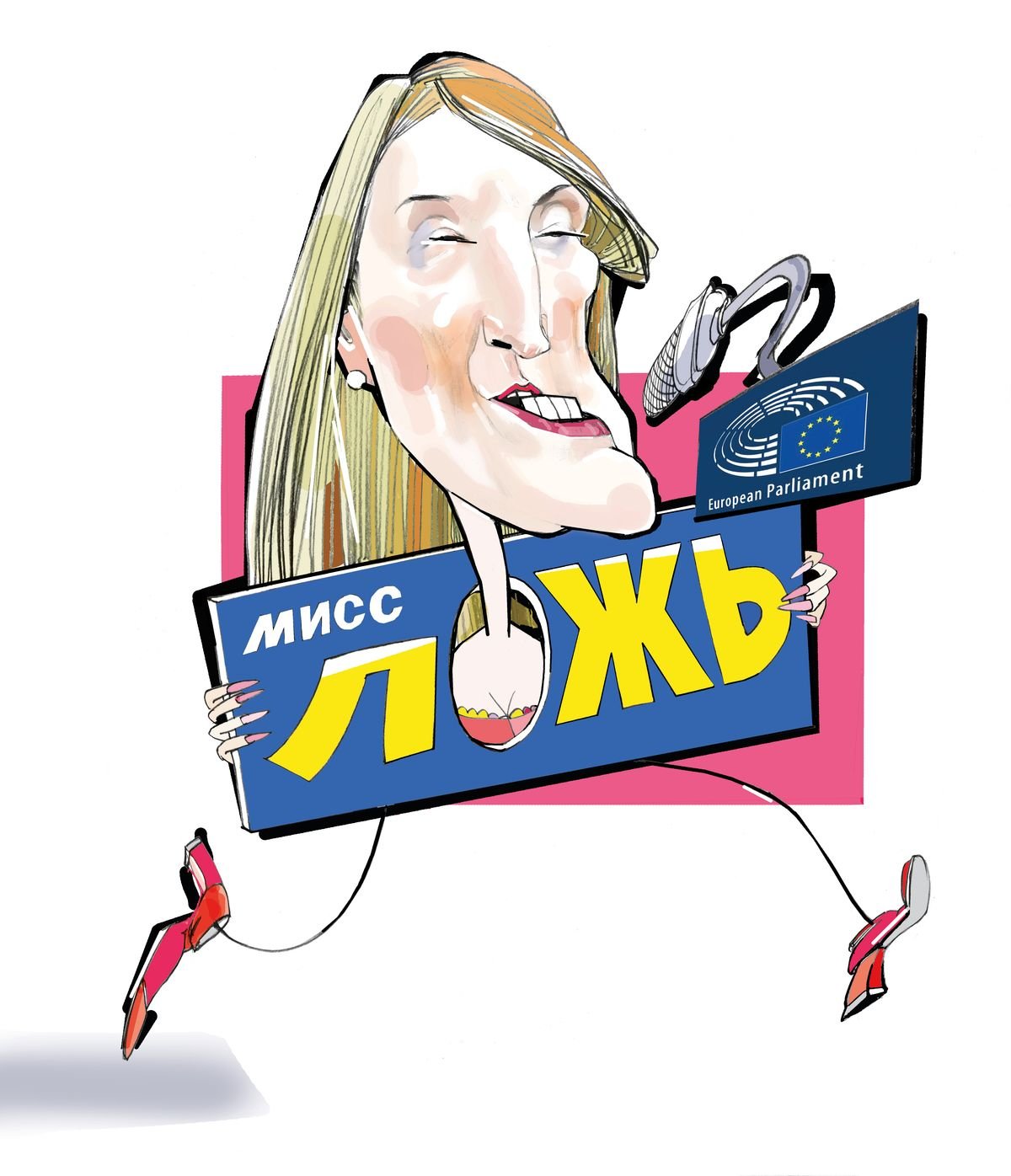
But it must be understood that few people remember and understand the meanings of Soviet caricatures.
Description of the current political crisis in Belarus:
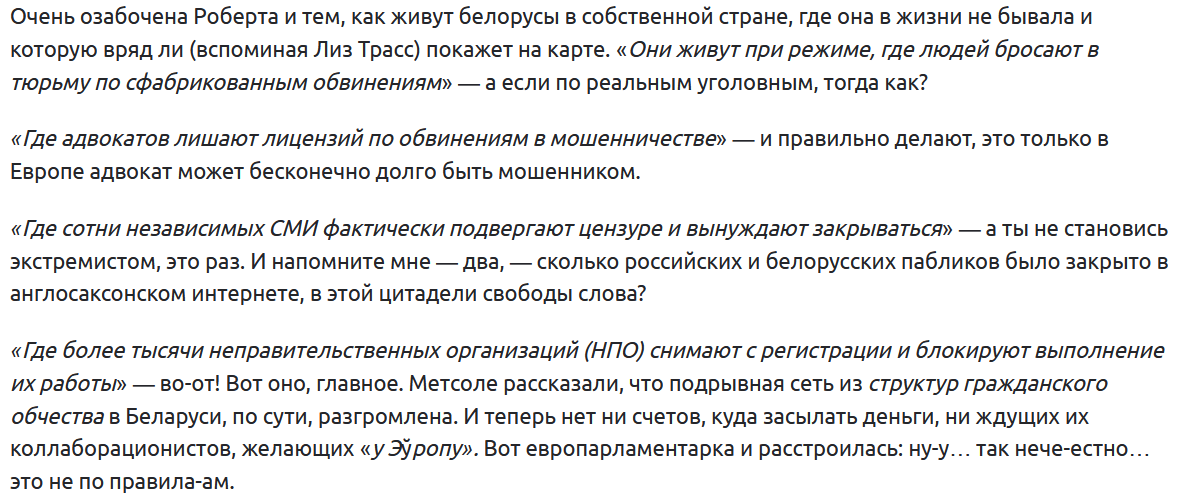
The text clearly distorts facts and uses propaganda methods. For example, claims about Roberta Metsola and Sanna Marin are presented in an extremely negative and unconfirmed light, mixing facts with assumptions and slander. Known European political institutions and personalities are demonized in order to undermine trust in them and create a hostile attitude towards the European Union as a whole. A. Mukovozchik deliberately distorts the goals and actions of the EU, presenting them in an exclusively negative light and without an objective basis. The author uses conspiracy theories – one of the key indicators of disinformation – for example, regarding the role of Europe in world politics and its attitude towards refugees. The rhetoric is aggressive, emotionally charged, aimed at manipulating the feelings of readers, convincing them of the truthfulness of the distorted representation of the situation. The text also uses generalizations and stereotypes (for example, regarding Europeans and representatives of various nationalities), which leads to the spread of false representations and the strengthening of biased views. The complex context of international and political issues is not presented. Such simplification is also one of the significant signs of disinformation.
Thus, the publication is an example of disinformation, as it includes all its essential signs: distortion of facts, demonization of political figures and institutions, conspiracy theories, aggressive rhetoric, generalizations and stereotypes, lack of context and balance, and deliberate distortion of the goals and actions of the EU.
13.12.2023 Lyudmila Gladkaya: The enemy does not sleep. In its immediate plans – financing disinformation and pressure on business
Quote from the text:

The text describes the support of civil society by the EU as interference in the internal affairs of Belarus, hinting that the funding of NGOs is part of an enemy plan. Essentially, this is deliberate disinformation aimed at discrediting and criminalizing the legitimate and legal actions of civil society. Civil activists (for example, Ales Bialiatski) are mentioned in the text in a negative context to undermine their reputation and justify persecution. The author ignores the importance of transparency and accountability of power, seeking to justify the need to maintain the status quo. L. Gladkaya claims that the EU and other international organizations illegally exert pressure on the Belarusian state and business through sanctions. This thesis represents an attempt to justify and rationalize the actions of the current government and divert attention from internal problems. She accuses Western countries of seeking to destabilize Belarus and overthrow its government: disinformation is aimed at forming a hostile perception of the West.
Mentioning plans “to protect democracy in the country” and “to hold the regime accountable,” discussed in Washington, may be an example of using conspiracy theories to strengthen authoritarian power and justify its actions.
Overall, the text contains elements of disinformation aimed at discrediting civil society, distorting the actions of Western countries, and supporting the current authorities, while minimizing the importance of transparency, accountability, and freedom of speech.
21.12.2023 Andrey Mukovozchik: The trend is such: we are still writhing at one end, and new sprouts are already appearing at the other
The text is accompanied by a caricature image:

The text itself acknowledges the fact that the current regime has started using the term “civil society” for its purposes, forming the “right” civil society in their desires:

The text exhibits clear political bias and uses emotionally charged language instead of presenting facts. This creates a biased and one-sided perception of civil society and non-governmental organizations (NGOs). The term “муковозчик” [possibly a derogatory term or a typo] devalues the role of NGOs, mentioning their “cleansing” and implying that they represent a threat. Various propaganda techniques are used, including demonizing the opposition and exaggerating the threat from “external enemies.” Such an approach aims to discredit government critics and strengthen control over public opinion. The author employs generalizations and stereotypes to describe certain groups (for example, civil society activists), which promotes the spread of false perceptions about them. The text lacks a balanced analysis of the situation, instead focusing on a one-sided interpretation of events and views. Mentioning subversive activities and anti-state grants without providing concrete evidence can be considered an element of conspiratorial thinking.
Overall, this text is an example of disinformation aimed at shaping a negative perception of civil society and NGOs, as well as strengthening approval of the current authority through distortion of facts and manipulation of public opinion.
24.12.2023 How Lithuania Cultivated Opposition for Belarus and Got It for Themselves
Belarusian authorities, through controlled media, continue actions aimed at deteriorating neighborly relations with the European Union countries:
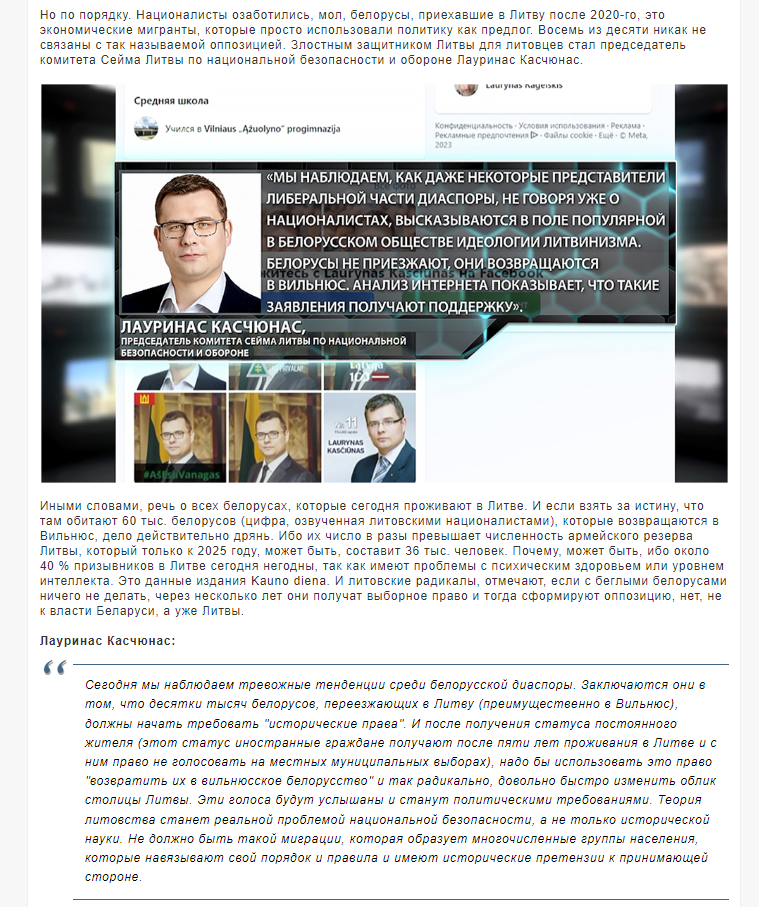
The text portrays the actions of the Lithuanian government in a negative light, accusing it of deliberately nurturing opposition for Belarus. The goal of the disinformation is to undermine trust in the Lithuanian authorities. The conspiratorial thesis that Lithuania coordinated a “failed coup” in Belarus in 2020 is not supported by factual evidence. The claims that Belarusian emigrants could change the political landscape of Lithuania in the future and pose a threat to its national security are aimed at creating distrust and hostility towards them.
The criticism of international efforts to support Belarusian civil society aims to weaken external support for the opposition. Describing the actions of Belarusian civil society and its support from Lithuania as “radical Lithuanianism” distorts their contribution to the promotion of democracy.
Overall, the text is an example of disinformation aimed at discrediting the Lithuanian government and its support for Belarusian civil society, creating fear and distrust towards immigrants, and distorting the role of civil society in promoting democratic changes.
26.12.2023 Who Prepared the Bulldozer for Vučić, Using Traditional Methods of Democracy to Displace Unwanted Power
Coverage of events in Serbia according to Belarusian state television:
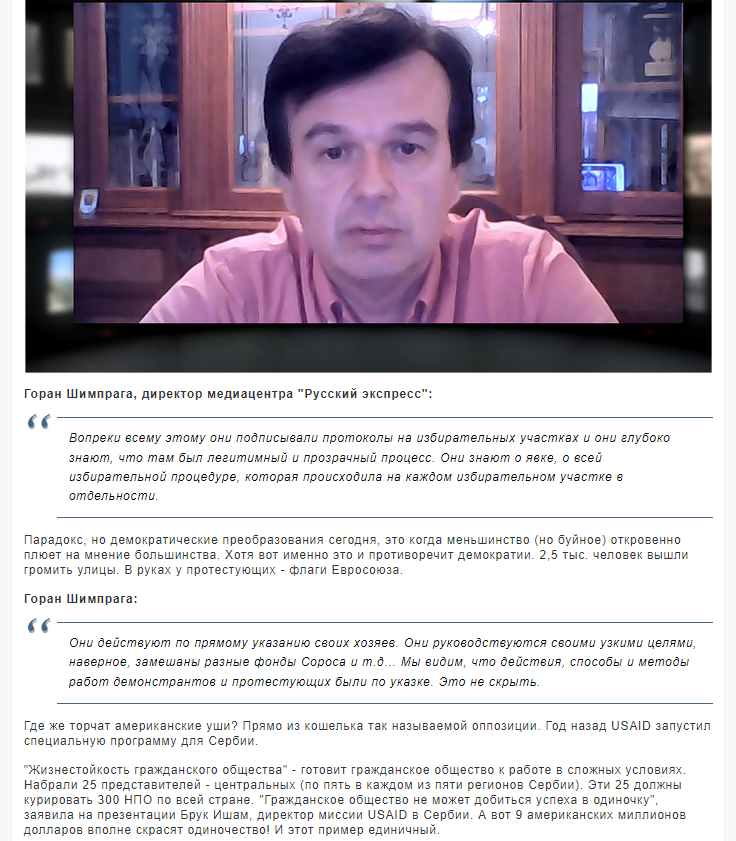
The author claims that events in Serbia are part of pre-planned coups organized by Washington and Brussels. This is a classic example of a conspiracy theory, used to explain internal conflicts through external interference. Protesters and opposition movements are characterized as puppets in the hands of foreign powers, a way to discredit legitimate political opponents. Allegations of Western countries’ and organizations’ interference (e.g., Soros foundations) attempt to create an image of the West as an aggressor and manipulator.
Describing NGOs as tools of foreign influence discredits these organizations and their role in promoting democracy and civil rights. The text uses propagandist methods: mixing facts with fiction, irony, hints at catastrophic consequences of democratic processes. Disinformation is aimed at undermining trust in democratic processes, discrediting the opposition and civil society organizations, and creating a negative perception of Western countries and their policies towards other states.
28.12.2023 Internal Cohesion Against Any External Threats
Author: Vadim GIGIN, Ph.D. in History.
About Belarusian civil society it is said:
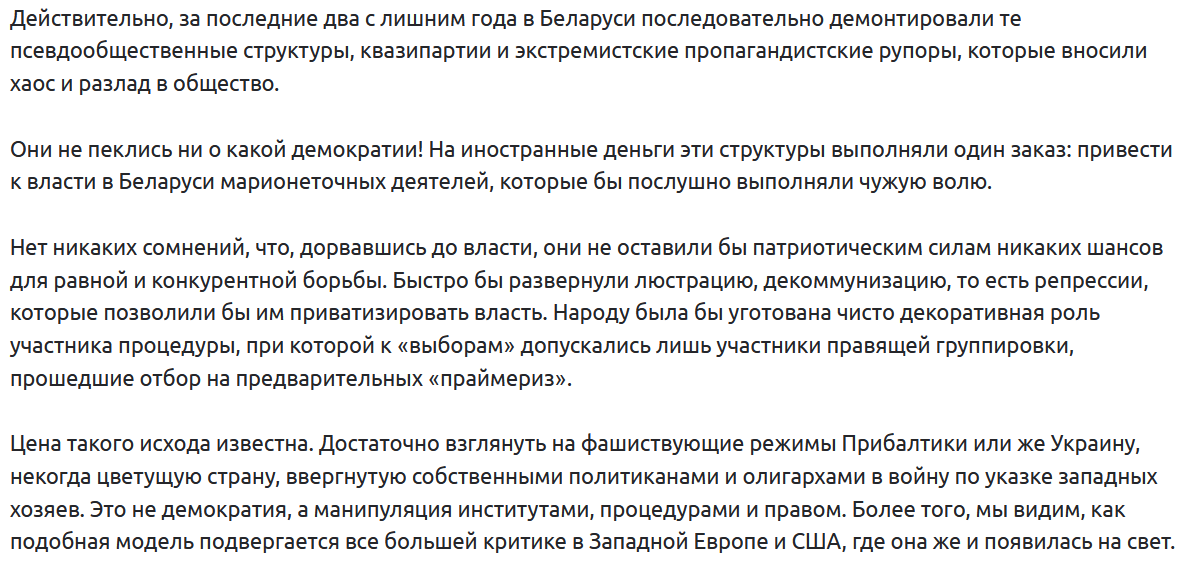
The text represents a disinformation narrative of the political situation in Belarus, heavily focused on supporting the current regime. The main emphasis is on the importance of internal unity and cohesion in response to external threats and geopolitical challenges. Many of the “threats” are presented in a distorted form.
The discussion of Belarus’s political system and the role of the All-Belarusian People’s Assembly is based on the certainty of unanimous, monolithic support for the current government, with critical opinions and alternative views not considered. The text also noticeably lacks an objective view of political parties and their role in society.
Gigin asserts that Belarus is successfully developing along a unique path, different from Western models. However, this viewpoint is presented one-sidedly, without considering international assessments of the political situation in the country.
Overall, the text can be viewed as an example of state propaganda, aimed at strengthening the power of the current regime through disinformation and distortion of facts.
The most toxic sources of disinformation about Belarusian civil society in December 2023 were Belarusian State Television and Radio Company and SB. Belarus Today.
ONT TV channel and Sputnik.by propagated a pro-Russian agenda.
We hope that the presented data will be used in assessing the narratives promoted in the information environment for preparing response plans to possible new trends, to minimize the impact of disinformation on public opinion.


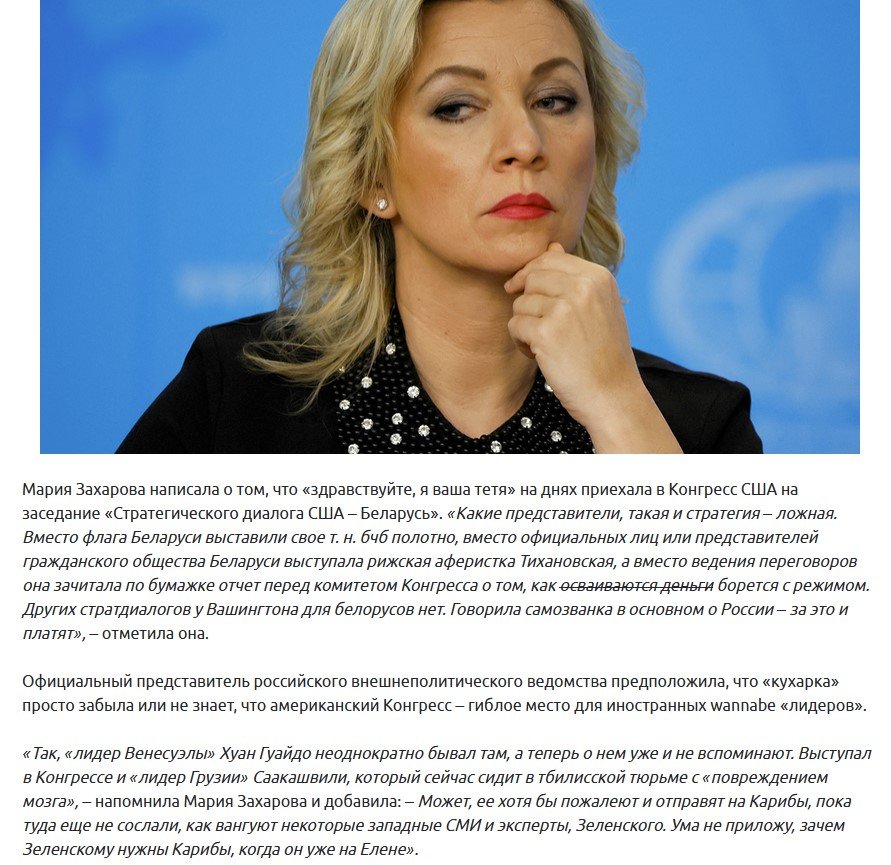


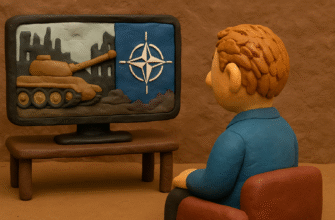


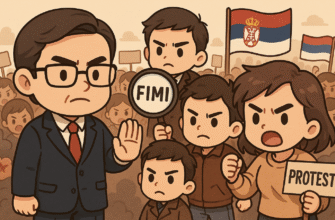

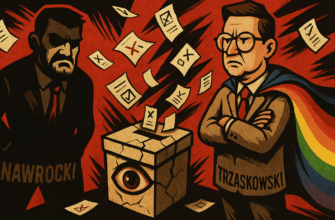
Comments are closed.